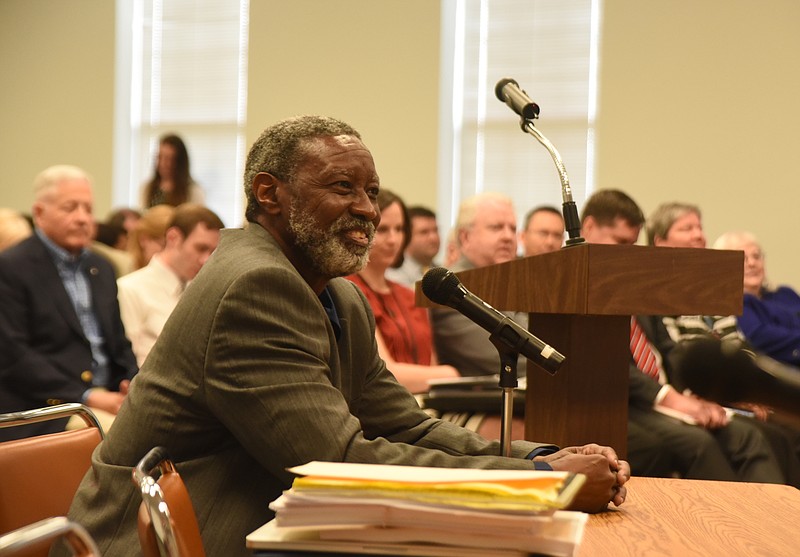Hamilton County school board members decided Thursday that, in spite of what you may have heard or believed, things are just fine, thank you.
As such, they elected as interim superintendent the man most thoroughly tied to the current system of the three candidates under consideration, a man who seemed the least prepared of the three they interviewed for about 30 minutes apiece, and a man whose answers to their questions were earnest but vague.
Dr. Kirk Kelly, who has spent more than 15 years in the Hamilton County Schools central office and had been one of two acting co-superintendents, now will serve until a search for a permanent superintendent is completed.
But who's to say the same five board members - three retired teachers and the panel's two black members - won't propose their new interim superintendent, who also is black, have the "interim" removed from his name at an upcoming meeting?
After all, that's what the board did in 2012 when it elected the recently retired Rick Smith as superintendent.
Either of the other two candidates, Normal Park Museum Magnet Principal Jill Levine or retired Marine Col. Shaun Sadler, who received two votes apiece from other board members, could have served as the change agent the public, business leaders, parents and many teachers have said they wanted.
But the five members who voted for Kelly - Joe Galloway, Steve Highlander, Karitsa Mosley, George Ricks and David Testerman - evidently figured the devil they knew was better than the devil they didn't.
One of those members, Mosley, only moments before the vote, spoke as if she understood that the public was seeking regime change from the good ol' boy central office led by Smith, who had stumbled badly in his handling of a rape case involving an Ooltewah High School basketball player in December.
She hoped the interim superintendent would be someone to "change the culture" and "want to do something different," she said. But then she voted for someone as close to the system's current culture as one could get.
It was also Mosley who had asked Kelly, during his interview, about a time when he had to think out of the box, or, as she put it, "shake up the box."
Kelly didn't respond with anything he'd done but instead suggested several nebulous things he might do if the body elected him, like find different ways of professional development, bring in the student voice and work closely with the faith-based community.
At that point, Ricks began to help him by suggesting things the candidate did when he was principal at Alton Park Middle School 20 years ago.
Kelly also misfired in answering another one of Mosley's questions about how he could turn around the district's lowest-performing schools.
Instead of ideas involving a student's earliest years, where mastery of reading and other skills are most critical, he suggested high school students have practice ACTs, retake the ACT if their scores are low and provide students "resources" so they can do better on a second ACT.
Kelly also provided few specifics to a question by Highlander on how to change the district's poor teacher morale.
He would go to each school, he said, listen to the teachers, take their input and see what they need.
Neither did Kelly provide much of an answer to Donna Horn's question about resolving the many problems, including "blackballing, red-flagging, negative recourse, fear of retaliation, special favors, demotions, promotions, the issuance of performance improvement plans or any other unnecessary measures," emanating from the very central office of which he is a part.
The central office, Kelly said, needs to be a "culture of helping and support."
Before the vote, only Galloway and Highlander said why they planned to choose Kelly. Galloway said he "answered every question," and Highlander said it was "crunch time" this late in the year and his choice was "ready to go."
Of course, it will be difficult for an interim superintendent to visit every school, as he said he'd do, at the district's "crunch time," but never mind.
Now the body must turn its attention to the search for a new superintendent - if it doesn't abruptly nominate its interim.
According to Chairman Dr. Jonathan Welch, the board cannot vote on a new superintendent 45 days before or 30 days after a school board election, which is Aug. 4. Although it would be better to have a new superintendent on the job as soon as possible since its interim is not the change agent the system needs, it's more important for the board to take its time and effort to make sure it selects the right person.
With the Chattanooga 2.0 movement putting a sharper focus on the need for a better education system, with the district's most recent abysmal test scores, with a devastating report from the state in response to the district's improvement plans, and with a recent report from UnifiEd saying that 83 percent of community conversation participants wanted a change agent as superintendent, we had hoped the school board might look forward in its interim superintendent search rather than marching in place.
But five members of the board seem to like their current view.
